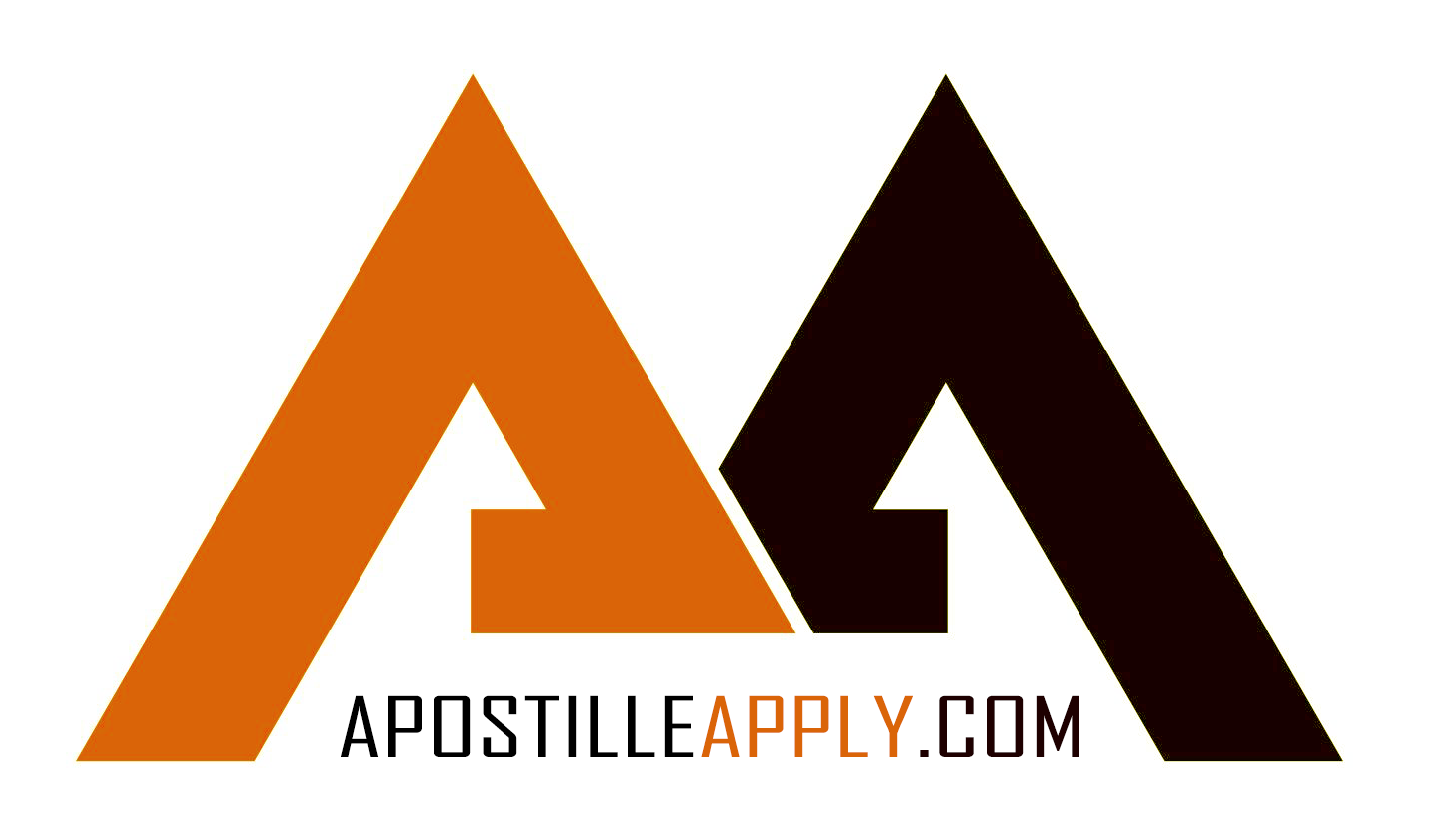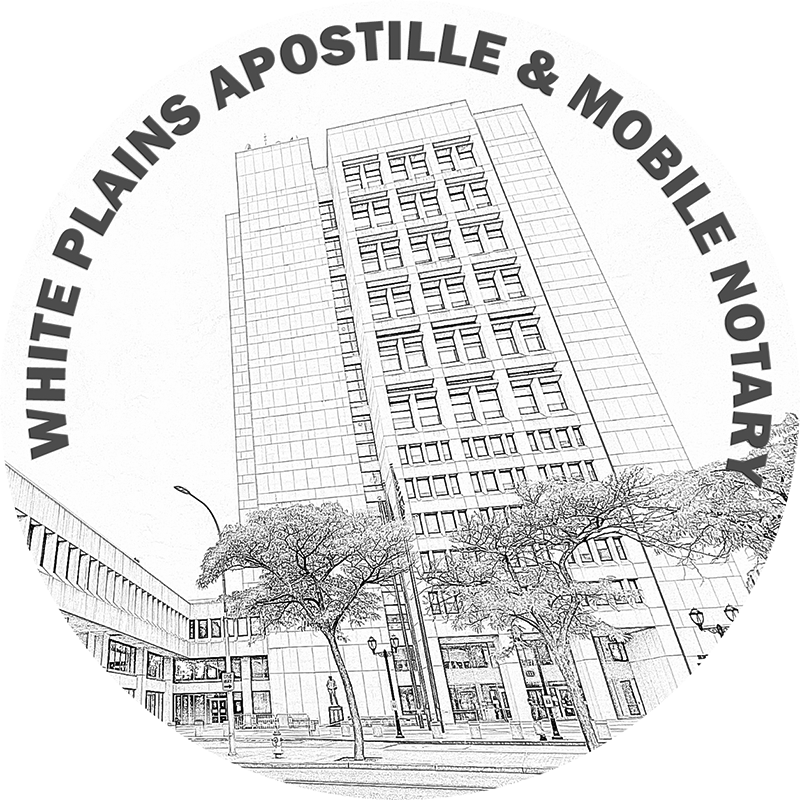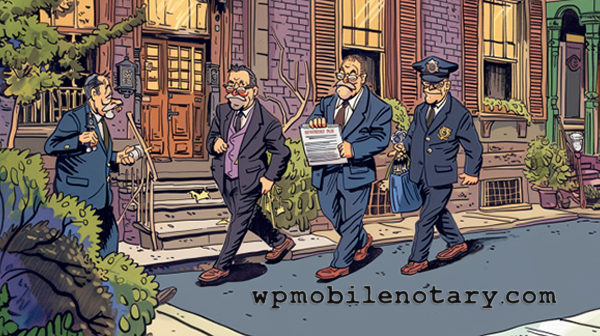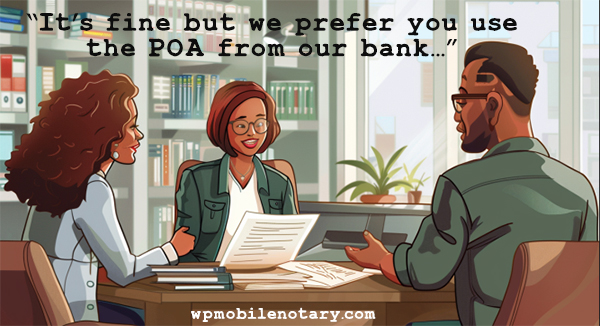Welcome to White Plains Apostille & Mobile Notary providing same day Apostille service for Westchester County, Rockland County, Putnam County and New York County. Next day service is available to any other county in New York State including The Bronx, Brooklyn, Queens and Staten Island.
BEGIN AN APOSTILLE ORDER
or
REQUEST MOBILE NOTARY SERVICE
or
FIND A PHYSICAL LOCATION FOR NOTARY
Questions about our services? Text, WhatsApp or call our Apostille intake coordinator Amanda Reese at (914)441-2444.
We also offer 24 hour mobile notary services. It works just like Uber! Just enter your zip code and general time being requested. Notaries are available 24 hours a day and 7 days a week including holidays.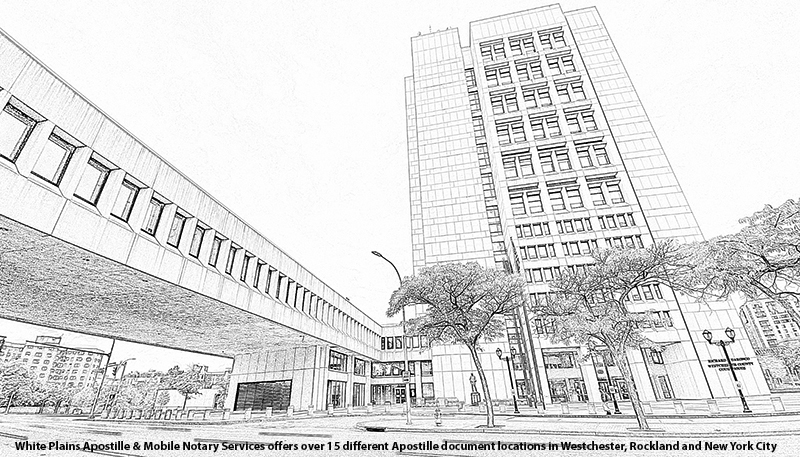
Mobile Notary Request:
The Apostille Notarization Process: Why It’s More Than Just a 5-Minute Task

Every POA Apostille begins with notarization…
If you’ve ever needed a document notarized, you might have thought that the process would be quick and simple – just a matter of stamping and signing a piece of paper. However, as a professional notary public serving Westchester County, White Plains Apostille & Mobile Notary wants to shed light on the intricacies involved in every notarization, especially in light of the new regulations set forth by the New York Department of State.
On January 25, 2023, New York implemented new regulations as part of its Electronic Notary legislation. These regulations, found in 19 NYCRR, Chapter V, Subchapter E, Part 182, Sections 182.2 – 182.11, outline specific record-keeping requirements for all notarial acts. Section 182.9 mandates that notaries maintain detailed records for every notarization performed, including the date, time, type of notarial act, individuals involved, credentials used for identification, and more. As a matter of law, these records must be maintained for at least 10 years.
It’s important to note that the majority of our notarizations at White Plains Apostille & Mobile Notary involve additional county clerk authentications and Apostille with the Department of State. While these documents may ultimately be used internationally, each of these processes begins with a basic notarization that is regulated by New York State law. Our business model is primarily focused on providing Apostille services, which require a multi-step process that goes beyond a simple notary signing.
To ensure compliance with these regulations and to facilitate the Apostille process, White Plains Apostille & Mobile Notary requires that every notarization be properly scheduled and documented in our secure CRM billing system. This process involves more than just a quick meeting with a notary; it requires careful coordination to ensure that our mobile notary knows exactly where to meet the signer and that all necessary information is collected and recorded in accordance with New York State notary laws.
When you schedule a notarization with White Plains Apostille & Mobile Notary, our team takes the time to set up your account properly, gather all required details, and ensure that our notary is fully prepared to meet with you at the designated time and place. This attention to detail not only guarantees a smooth, efficient notarization process but also demonstrates our commitment to adhering to all legal obligations and facilitating the Apostille process for our clients.
We understand that in today’s fast-paced world, time is a valuable commodity. However, we also recognize the importance of maintaining the integrity of the notarization process and protecting our clients by following all necessary regulations. By taking the time to properly schedule and document each notarization, we can provide our clients with the peace of mind that comes with knowing their documents are being handled with the utmost professionalism and legal compliance, setting the stage for a successful Apostille process.
If you’re in need of Apostille services in Westchester County, trust White Plains Apostille & Mobile Notary to guide you through the process. Our team of experienced notaries is dedicated to providing efficient, legally compliant services that meet your needs and exceed your expectations. Contact us today to schedule your notarization appointment and take the first step towards obtaining an Apostille for your international documents.
One final mention is that of accepted forms of payment. For the first transaction, all fees must be paid with a valid credit card under the signer’s own name. Absolutely no cash is permitted for initial transactions. This policy ensures a secure and traceable payment process, which is crucial given the legal scrutiny under which our company operates. On subsequent Apostille orders, we can accept various electronic payment methods such as Venmo, PayPal, CashApp, or Zelle. However, we do not accept cash or bitcoin for any transactions. As Apostilles are regulated under Hague International Law, maintaining strict financial records and transparency is of the utmost importance.
10 Essential Things You Need to Know About Apostille Birth Certificates

Are you planning to study abroad, get married in a foreign country, or immigrate to another nation? If so, you’ll likely need an apostille birth certificate. But what exactly is an apostille birth certificate, and why is it essential? In this article, we will provide you with the top 10 things you need to know about apostille birth certificates.
What is an apostille birth certificate? An apostille birth certificate is a document that verifies the authenticity of your birth certificate for use in another country that is a member of the Hague Apostille Convention. The Hague Apostille Convention, also known as the Apostille Convention, is an international treaty that simplifies the process of certifying documents for use in foreign countries. The apostille is a certificate attached to the birth certificate that proves its authenticity.
The purpose of an apostille birth certificate is to ensure that your birth certificate is recognized and accepted as valid in another country. This is particularly important when you need to provide your birth certificate for legal or administrative purposes, such as applying for a visa, getting married, or establishing legal residency.
If you are located in White Plains, New York, and need an apostille birth certificate, White Plains Apostille & Mobile Notary can assist you with the process. They offer expedited apostille services and can help ensure your documents are properly authenticated and apostilled.
Why do you need an apostille birth certificate? Having an apostille birth certificate is essential because it serves as proof of your identity and nationality when dealing with international affairs. Without an apostille, your birth certificate may not be recognized or accepted by the foreign government or organization you are dealing with. This can cause delays, complications, or even the rejection of your application.
For example, if you are applying for a student visa to study abroad, the immigration authorities may require a certified copy of your birth certificate with an apostille. Similarly, if you are getting married in a foreign country, the local government may request an apostilled birth certificate to validate your eligibility for marriage.
Difference between an apostille birth certificate and a regular birth certificate A regular birth certificate is the original document issued by the government or the authority responsible for recording births in your place of birth. It contains essential information such as your full name, date of birth, place of birth, and the names of your parents.
On the other hand, an apostille birth certificate is a certified copy of your original birth certificate that has been authenticated with an apostille. The apostille is a separate document that is attached to your birth certificate and verifies its authenticity.
The main difference between the two is that an apostille birth certificate has undergone an additional step of legalization, making it internationally recognized. A regular birth certificate may not be accepted as valid proof of your identity and nationality in another country, while an apostille birth certificate is universally accepted under the Hague Apostille Convention.
How to obtain an apostille birth certificate Obtaining an apostille birth certificate involves several steps:
- Gather the necessary documents, such as your original birth certificate and valid identification.
- Contact the relevant authority responsible for issuing apostille birth certificates in your country.
- Submit your application along with any applicable fees.
- Wait for processing, which can vary depending on factors such as the volume of applications and the efficiency of the issuing authority.
- Receive your apostille birth certificate, which will typically be a certified copy of your original birth certificate with an attached apostille.
If you are in the White Plains area, you can order your birth certificate directly from vitalchek.com. However, if you are ordering a birth certificate for New York City or any of the five boroughs, you will need to request an “exemplified” copy meant for international use. The process for obtaining an apostille birth certificate in New York City can be more complex, which is why it is often recommended to work with an experienced apostille service provider like White Plains Apostille & Mobile Notary.
White Plains Apostille & Mobile Notary can also handle the authentication of your documents at the Westchester County Clerk, located at 111 Martin Luther King Blvd in downtown White Plains or the New York City Clerk on Centre Street in Manhattan. This can save you time and ensure that your documents are properly prepared for the apostille process.
Apostille birth certificate requirements When applying for an apostille birth certificate, you will typically need to provide the following:
- Original birth certificate
- Valid identification (passport, driver’s license, etc.)
- Completed application form
- Payment of applicable fees
It’s important to consult the specific instructions provided by the issuing authority to ensure compliance with their requirements.
Common mistakes to avoid when getting an apostille birth certificate To ensure a smooth and efficient process, avoid these common mistakes:
- Submitting an incomplete or incorrect application
- Failing to provide all necessary supporting documents
- Not allowing sufficient time for processing
- Not following up on the status of your application
How long does it take to get an apostille birth certificate? The processing time for an apostille birth certificate can vary depending on the issuing authority and the volume of applications. It’s advisable to apply well in advance of your intended use to allow for any unexpected delays. Some issuing authorities may offer expedited processing services for an additional fee. At White Plains Apostille it can take as little as one-day when using one of our professional expediters.
How much does it cost to apostille a birth certificate? The cost of apostilling a birth certificate can range from $10 when plus postage when mailing your birth certificate directly to the Department of State, to a few hundred dollars, when you require the document back in your hands for a 4pm flight out of JFK or Laguardia Airport.
Apostille birth certificate services Apostille service providers, such as White Plains Apostille & Mobile Notary, specialize in assisting individuals with obtaining apostilles for various documents, including birth certificates. They are familiar with the requirements and procedures of different countries and can help ensure a smooth and efficient process. Using an apostille service can save you time, effort, and potential complications, especially if you are unfamiliar with the process or have strict deadlines to meet.
Conclusion An apostille birth certificate is a crucial document when dealing with international affairs. Whether you are studying abroad, getting married, or immigrating to another nation, having an apostille birth certificate is essential.
If you are in the White Plains area and need assistance with obtaining an apostille birth certificate, White Plains Apostille & Mobile Notary can help. Their experienced team can guide you through the process, handle the authentication of your documents, and ensure that your apostille birth certificate is obtained as quickly and efficiently as possible.
By following the guidelines and requirements provided by the issuing authority and working with a trusted apostille service provider, you can obtain your apostille birth certificate and embark on your international endeavors with confidence.
Have questions? Reach out to our expediters by WhatsApp or regular messaging at (914)441-2444 or begin your application at apostilleapply.com
We are Proudly a Google 4.9 Star 125+ Review Apostille Service!
Experience the Highest Rated Apostille Service in Westchester with White Plains Apostille

No other company processes more apostille documents or understands the complexities better than White Plains Apostille (also Corporate Apostilles). Don’t just take our word for it! Check out our amazing 5-star feedback on Bing, Yelp Pages, NiceLocal, Trustpilot and 5 stars from Chamber of Commerce. Our reviews reflect our unwavering commitment to providing excellent service to our customers and their documents.
At White Plains Apostille, we stand behind our “5-star Apostille submission guarantee” program. If a country rejects your apostilled documents, we will refile them at no additional charge. Achieving 100% customer satisfaction is our top priority.
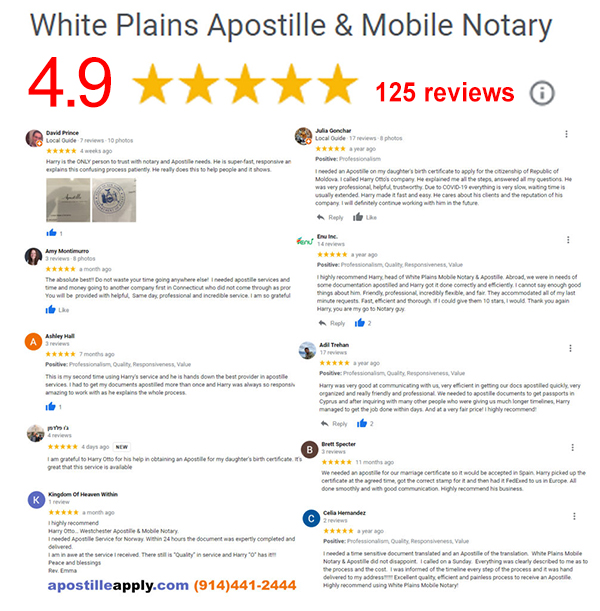
Embracing Opportunities for Growth
We value Google reviews as a critical tool for identifying areas where we can improve to better serve our clients. While we strive for excellence, we understand that no business is perfect, which is why we openly acknowledge and embrace our 4.9/5 rating on Google reviews as an opportunity for growth.
One review, in particular, taught us a valuable lesson about the importance of transparent communication regarding our policies and procedures. The reviewer expressed frustration over a delay in receiving an urgent document due to a misunderstanding about overall payment requirements. Simply put, this reviewer had not paid for their order, nor intended to. We aim to provide the highest level of professionalism, and this experience highlighted the need for clearer explanations upfront. Authentication and apostille services through the New York State Department require payment before processing to ensure a seamless and efficient experience for our clients, much like ordering a product from companies like law firms, accounting firms, or even a local ride from Uber.
In this particular case, the reviewer had not completed payment for their order, which is required before we can process authentication and apostille services. While their experience highlighted room for improvement in our upfront communication about payment policies, we did not actually experience any misunderstanding – order policies were simply not followed.
Continual Improvement and Unparalleled Customer Service
At our core, we are committed to continual improvement and exceeding client expectations. We embrace feedback, even when it falls short of perfection, as a chance to enhance our processes and reinforce our dedication to unparalleled customer service.
Ask us about our “5 Star Submission Guarantee” that means “we will refile your documents at NO CHARGE if they are denied!” Inquire about our inexpensive document replacement insurance to replace your Apostille if it is lost, stolen, or destroyed. Did you know that even our Northern Westchester applicants can experience same day “in your hands” Apostille processing if your documents are in by 11 AM? So, if you’re in Dutchess, Rockland, Putnam, or Orange County, we have you covered!
Apostilling a Procura: Navigating the Differences Between New York and Italian Power of Attorney Laws

New York Apostille Expediter Harry Otto has processed thousands of Procura Speciale and Generale Apostilles with every region of Italy and has engaged with hundreds of notaries all around Italy. He’s also notarized hundreds of Power of Attorney documents in New York and has dug deep into the similarities and differences between how New York and most of Italy regulate the creation and overall processes of these documents. Through his extensive experience, Harry Otto has gained invaluable insights into the intricacies of the Italian and New York legal systems concerning powers of attorney.
This article delves into the comparison between the New York Power of Attorney and its Italian counterparts, the “Procura Speciale” and “Procura Generale.” It explores the recent changes in New York Power of Attorney law, which went into effect on June 13, 2021, and how these changes compare to the Italian legal framework. The article examines the execution requirements, costs, and enforcement mechanisms in both jurisdictions, highlighting the key differences and similarities.
For legal professionals and businesspeople operating in both New York and Italy, understanding these differences is crucial. The article provides a comprehensive analysis of the principle of “parallelismo delle forme” and the need for “equivalenza” when dealing with foreign powers of attorney in Italy. It also discusses the role of the Apostille and the legalization process for countries not part of the Hague Convention.
Throughout the article, Italian legal terms and concepts are explained to educate New York lawyers about the Italian legal system. The article also incorporates New York case law, where applicable, to illustrate the practical implications of the power of attorney laws.
If you are a legal professional or a business person involved in cross-border transactions between New York and Italy, this article is an essential resource for understanding the complexities of powers of attorney in both jurisdictions. By reading this article, you will gain valuable insights into the differences in execution requirements, costs, and enforcement mechanisms, enabling you to navigate the legal landscapes of New York and Italy more effectively.

Comparing the New York Power of Attorney and the Italian “Procura Speciale”
The Power of Attorney (POA) is a legal document that allows an individual (the principal) to appoint another person (the agent or attorney-in-fact) to act on their behalf in various matters, including personal and financial affairs. In New York, the Statutory Short Form Power of Attorney is governed by Title 15 of Article 5 of the General Obligations Law. Similarly, in Italy, the “Procura Speciale” is a legal instrument that enables a principal to delegate specific powers to an agent for the completion of one or more legal acts.
Recent changes to the New York Power of Attorney law, which went into effect on June 13, 2021, aimed to simplify the POA form and reduce the frequency of refusal by financial institutions to honor validly executed POAs. These changes include:
- Substantial compliance with statutory language, allowing for minor deviations in the POA form.
- Elimination of the separate Statutory Gift Rider, with gifting provisions now included in the modifications section of the POA form.
- Penalties for unreasonable refusal to accept a valid POA, including the award of damages and attorney’s fees.
- A safe harbor for third parties acting in good faith when accepting a POA.
- Execution requirements, including the need for the POA to be witnessed by two persons who are not named as agents or permissible recipients of gifts.
In contrast, the Italian “Procura Speciale” is governed by the Italian Civil Code (Codice Civile) and is subject to the principle of “parallelismo delle forme,” which requires the power of attorney to have the same form as the contract or legal act to be concluded. However, this principle is mitigated for powers of attorney originating from abroad by Article 60 of Law No. 218 of May 31, 1995, which states that the act of conferring the power of representation is valid, as to form, if it is considered as such by the law regulating its substance or by the law of the State in which it is executed.
For a foreign power of attorney to be equivalent to an Italian public deed (atto pubblico) or authenticated private agreement (scrittura privata autenticata), it must be substantially equivalent according to the notion understood by the Italian legal system, a principle defined by legal scholars as the need for “equivalenza” between the foreign act and the Italian act.
It is essential that the authority issuing the power of attorney has the power to perform notary-like functions. In countries where the notary figure is absent, such as Ireland, the United Kingdom, the United States, Australia, Canada, and Hong Kong, the role of the “public notary” exists, albeit with limited functions and responsibilities compared to Italian notaries.
Execution Requirements and Costs
Under the updated New York Power of Attorney law, a statutory short form power of attorney executed in New York must be typed or printed using legible letters no less than twelve points in size and signed, initialed, and dated by a principal with capacity, or in the name of such principal by another person, other than a person designated as the principal’s agent or successor agent, in the principal’s presence and at the principal’s direction. The signature must be duly notarized and acknowledged and witnessed by two persons who are not named in the instrument as agents or permissible recipients of gifts. The person who takes the acknowledgment may also serve as one of the witnesses.
In Italy, the identification of the parties (the principal and the agent) does not necessarily require all the elements prescribed by Italian notarial law (name and surname, place and date of birth, domicile, or residence). The indications required by the applicable foreign law for authentication will suffice, provided there is certainty about the subject’s identity. Importantly, the signature must be made in the presence of the person who will authenticate the signature.
The costs and fees associated with powers of attorney differ between New York and Italy. In New York, the cost of a POA varies depending on whether it is a general or special power of attorney and the services offered by the notary. A special power of attorney may have a lower cost than a general power of attorney, as it is not subject to registration with the tax authorities and is signed in a single original to be delivered by the notary to the party. Its overall cost consists of the stamp duty, archive tax, and notary’s fee.
In Italy, the costs and fees for a “Procura Speciale” are of significant importance, as Italian notaries yield much more power than their New York counterparts. The notary’s fee for each power of attorney is determined by the professional based on the complexity and preliminary activities to be carried out. A special power of attorney is subject to a €16 stamp duty (for powers of attorney up to 100 lines), while the costs for general powers of attorney vary depending on whether they must be registered in the Register of Enterprises (Registro delle Imprese).
Case law regarding the prior power of attorney law and gifting in New York remains in effect. Gifts of the principal’s assets must be in the best interest of the principal (In re Ferrara, 7 N.Y.3d 244 (2006)). Gifts made by an agent to themselves are valid if authorized by a specific provision in the power of attorney and made in the principal’s best interest, with no presumption of impropriety and the burden of proof on the person challenging the gift (In re Ferrara, 7 N.Y.3d 244). A gifting provision is not necessary when there is clear and convincing evidence that a transfer was compensation for services (Alsante v. Maika, 206 A.D.3d 1563 (4th Dep’t 2022)).
Enforcement and Recognition of Foreign Powers of Attorney
One of the most significant changes to the New York Power of Attorney law concerns the enforcement of POAs. If a special proceeding authorized by GOL Section 5-1510 is brought to compel a third party to honor the Statutory Short Form Power of Attorney, the court may award damages, including reasonable attorney’s fees and costs, if it finds that the third party acted unreasonably in refusing to honor the agent’s authority (GOL Section 5-1510(2)(a)). No third party can refuse, without reasonable cause, to honor a properly executed statutory short form power of attorney or one executed in accordance with the laws in effect at the time of its execution (GOL Section 5-1504(5)). This provision effectively grandfathers, for enforcement purposes, any properly executed Statutory Short Form Power of Attorney under previous statutes.
In Italy, the Hague Convention of October 5, 1961, introduced the Apostille, which verifies the authenticity of the signature and the capacity of the signatory of the act, constituting an attestation of the origin of its signature. This process simplifies the immediate reception of the document in the States adhering to the Convention. The Convention has established a standard formula and content for the Apostille, as well as a uniform graphic structure, requiring it to be inserted in a box with progressive numbering of the text lines. Regarding language, the Apostille does not need to be translated and can be written in French or the official language of the issuing authority, with the heading “Apostille” always included.
For countries not part of the Hague Convention, the process of legalization is followed, consisting of an official attestation by the Italian consular or diplomatic authority abroad of the legal qualification of the public official who signed the act and the authenticity of their signature. This process is divided into two distinct moments:
- The so-called “internal” legalization, which is purely eventual and may not even be provided for by the legislation of a particular State.
- The so-called “external” legalization, in which the Italian diplomatic or consular authority verifies that the document has been signed by a specific authority of the country of origin. This legalization is indispensable for allowing the document to circulate in Italy.
In conclusion, while both New York and Italy have legal instruments that allow principals to delegate authority to agents through powers of attorney, there are significant differences in the execution requirements, costs, and enforcement mechanisms. The recent changes to the New York Power of Attorney law have aimed to simplify the process and provide greater protection for principals, while the Italian “Procura Speciale” is subject to the principle of “parallelismo delle forme” and the need for “equivalenza” when dealing with foreign powers of attorney. Understanding these differences is crucial for legal professionals and businesspeople operating in both jurisdictions.

This article was researched and written by New York Apostille Expediter Harry Otto, All Rights Reserved. For more information call, text or WhatsApp White Plains Apostille & Mobile Notary at (914)441-2444 or begin your Apostille at apostilleapply.com
Expedited Apostille Services in New York: Meet the Rising Demand in 2024
Streamlined Apostille Services in NYC and Beyond – White Plains Apostille
In today’s globally connected world, the need for properly authenticated documents has never been greater. From birth certificates and marriage licenses to corporate records and academic transcripts, having these vital documents apostilled is crucial for ensuring they are recognized internationally.
This is where White Plains Apostille comes in. Led by seasoned expediter Harry Otto, this New York-based firm specializes in providing rapid and reliable apostille services for clients across the state.
What is an Apostille?
An apostille is a form of certification that verifies the origin and authenticity of a public document. It is required for official documents to be legally accepted in countries that are members of the Hague Apostille Convention. In New York, the Department of State Apostille office is responsible for issuing these certifications.
The Challenges of Obtaining an Apostille
Navigating the apostille process can be a complicated and time-consuming endeavor, especially if you’re unfamiliar with the requirements. From gathering the necessary documents to submitting them through the proper channels, the process can quickly become overwhelming.
This is where White Plains Apostille shines. With a deep understanding of the apostille system and years of experience, their team is adept at streamlining the entire process, saving you valuable time and effort.
Expedited Services for Your Convenience
Whether you need a document apostilled the same day, next day, or within 5 business days, White Plains Apostille offers a range of expedited service options to suit your specific needs. Their expertise extends to apostille services for clients in Westchester, Rockland, Putnam, and all five boroughs of New York City.
“We understand that time is of the essence when it comes to obtaining an apostille,” says Otto. “Our expedited services ensure that our clients can navigate the process smoothly, without unnecessary delays or headaches.”
A Comprehensive Range of Apostille Services
At White Plains Apostille, their team is well-versed in handling apostille requests for a wide variety of documents, including but not limited to:
- Birth certificates
- Marriage licenses and certificates
- Diplomas and academic transcripts
- Corporate records and business documents
- Passport applications
- FBI background checks and fingerprint certifications
- Translations and language certifications
Whether you’re an individual planning an international move, a business conducting transactions across borders, or simply need a document authenticated for use abroad, White Plains Apostille has the experience and resources to ensure your documents are properly certified and accepted.
Reliable and Trustworthy Apostille Experts
With a commitment to exceptional service and a track record of success, White Plains Apostille has established itself as a trusted partner for apostille services in New York. Their team of professionals is dedicated to guiding you through the process, answering any questions you may have, and ensuring your documents are handled with the utmost care and efficiency.
If you’re in need of apostille services in New York, look no further than White Plains Apostille. Contact them today to learn more about their expedited options and experience the convenience of streamlined document authentication.
Do I Always Need Two Witnesses When Writing My Will in New York?
When it comes to creating a valid will in New York State, many of our callers wonder if it is always necessary to have two witnesses present. The answer is not as straightforward as one might think, as there are certain exceptions to the witness requirement.
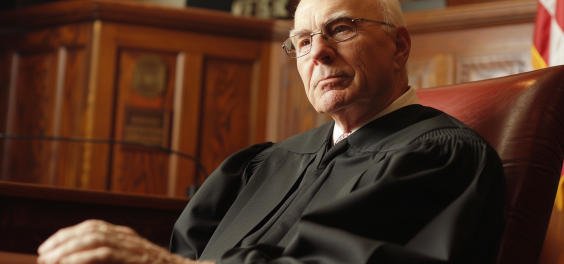
In this article, we will explore the legal intricacies surrounding the necessity of witnesses for wills in New York, with a particular focus on the validity of handwritten wills.
The General Rule: Two Witnesses Required For a typical typewritten or printed will in New York, the law requires the presence of at least two attesting witnesses (EPTL § 3-2.1(a)(4)). These witnesses must, within a thirty-day period, attest to the testator’s signature and, at the request of the testator, sign their names and affix their residence addresses at the end of the will (EPTL § 3-2.1(a)(4)). The testator must also declare to each of the attesting witnesses that the document is their will (EPTL § 3-2.1(a)(3)).
The Exception: Handwritten Wills However, there is an important exception to the witness requirement in New York State. According to EPTL § 3-2.2(a)(2), a handwritten will, also known as a holographic will, is valid without the need for attesting witnesses. For a holographic will to be considered valid, it must meet the following criteria:
- The entire will must be in the handwriting of the testator (EPTL § 3-2.2(a)(2)).
- The will must be signed by the testator at the end (EPTL § 3-2.2(a)(1)).
- The testator must have the mental capacity to make a will at the time it is written (EPTL § 3-1.1).
While witnesses are not legally required for a handwritten will, it is still advisable to have at least two individuals witness the signing of the document. This can provide additional evidence of the will’s authenticity and help prevent potential challenges to its validity (Matter of Teubert, 53 A.D.2d 869 (1976)).

The Option of Notarization for Witnesses Although not a legal requirement, if a testator opts to have two witnesses sign their handwritten will, a notary can acknowledge the witnesses’ signatures up to thirty days after they have signed, as long as the witnesses attest to having previously signed the will (EPTL § 3-2.1(a)(4)). This provides flexibility in the witnessing process and allows for the notarization of the witnesses’ signatures to occur at a later date. It is important to note that there is no provision in the EPTL for notarization of the testator’s signature on a will.
The “Importance of Proper Execution”, says Harry Otto, an apostille expediter and notary public at White Plains Apostille & Mobile Notary, often arrives at appointments for Last Will & Testaments in Westchester County and has to make judgment calls on what he’s willing to notarize and what he’s not. He makes it crystal clear: If he sees a will that is likely to get challenged in probate because the testator asked him to notarize their signature, and not those of the witnesses, he won’t do it because it will not create the self-proving aspect that the court would be looking for. If he sees mistakes in the document or in the request, he won’t offer legal advice, but he won’t notarize it and will ask the client to find another notary. It is crucial to ensure that a will is executed correctly to avoid potential issues during the probate process.
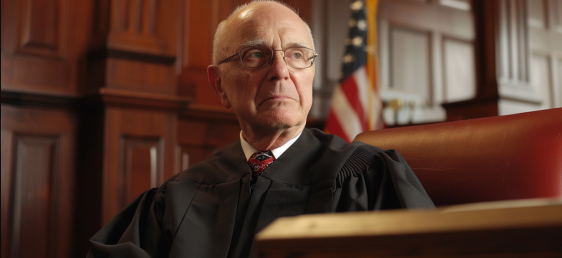
Harry Otto then goes on to say that although he lives and breathes this business and reads case law as a hobby, his main business is acting as an Apostille expediter, not an attorney, and especially not an estate planning attorney. He advises clients to pay for a consultation with an estate planning attorney, not a general practitioner, to get the right legal information. If it were up to him, everyone would have properly drafted trusts.
Conclusion In summary, while New York law generally requires two witnesses for a will to be valid, there is a notable exception for handwritten wills. A holographic will, entirely in the testator’s handwriting and signed by them, is considered valid without the need for attesting witnesses. However, it is still recommended to have witnesses involved to strengthen the will’s authenticity and minimize the risk of future legal challenges. If witnesses are used, a notary can acknowledge their signatures up to thirty days after they have signed. Proper execution of the will is essential to ensure its validity and to avoid complications during probate.
See our information regarding Trusts in New York as well.
Amanda Reese
White Plains Apostille & Mobile Notary
Expert Squatter Removal Services in Westchester County & White Plains: Notarized Lease Agreements and Document Delivery Assistance
Westchester County Leases for Removal of Squatters
If you own property in Westchester County or White Plains and have had your home or building occupied by squatters, you know how difficult it can be to remove them legally. As the New York Post reported, “Homeowners who go on vacation or a business trip, even for just a week, are returning to find their houses overtaken by trespassers who fraudulently claim a right to be there.”
Squatters in New York can actually gain legal rights to remain on a property through the principle of adverse possession if certain requirements are met over time. The Post explains: “In New York state, a homeowner faced with a trespasser can expect eviction to take two years. Meanwhile, the owner is barred from turning off utilities, removing belongings or doing anything else to get the invaders out.”
At White Plains Apostille & Mobile Notary, we understand the urgency of these situations for property owners. That’s why we charge minimum travel fees of $350 and usually slightly higher to notarize new lease agreements as part of the legal process for landlords to reclaim their properties from squatters. Here’s why our fee is higher than a standard $99 to $199 travel fees for notarization:
- Likelihood of Court Appearance
Once squatters establish tenancy rights after 30 days in NYC or 10 years elsewhere, landlords must go through formal housing court evictions, which are severely backlogged. Our notaries may have to validate the notarized lease during these proceedings. - Thorough Screening and Vetting
To ensure the lease’s validity cannot be challenged, we carefully screen all parties, verify identities, confirm the landlord’s ownership, and ensure the new tenant will actively take possession and pay rent. - Prioritization and Rapid Response
Our premium fee guarantees prioritized scheduling so a notary can swiftly notarize the lease before adverse possession rights fully take hold, which the Post warns is a growing danger: “Criminals from south of the border are coming in droves to plunder the far wealthier United States.” - Stringent Document Handling
We treat these leases similar to our loan signing agent services for banks like JPMorgan Chase and Citibank. Our notaries ensure proper printing, scanning, and execution of all documents to stringent standards, so their validity is defect-free and can withstand any court challenges. - Assisting Mortgage Lenders
In addition to working with property owners, our mobile notaries have collaborated with major mortgage lenders and banks to assist them in removing squatters from foreclosed properties they need to take possession of. We understand the unique requirements when dealing with these types of properties.
The premium fee accounts for these critical factors missing from a simple $99 travel fee for notarization. It reflects the urgency required once squatters gain tenancy rights, which can happen in as little as 30 days in NYC based on laws like this in the NYC Administrative Code:
“Any person who…holds over and continues in possession of any premises after being duly notified to quit the same shall be liable to pay double the monthly value of the premises so detained for so long as the same shall be detained.”
In Westchester County, the laws are similarly strict in the Westchester County Laws & Codes Ordinances:
“A person is guilty of criminal trespass when he knowingly enters or remains unlawfully upon premises. Criminal trespass is a violation.”
While our fee of $350+ is a premium rate, for notary travel fees (remember we are not attorneys – we work with your attorney), it provides landlords and mortgage lenders a completely valid, legally binding lease that allows them to efficiently regain control and remove squatters through proper court filings. This avoids costly legal battles like those the Post warns against: “Favoring intruders over owners are ‘takings’ that violate the Fifth Amendment.”
We urge any property owners or mortgage lenders dealing with squatters to act quickly before adverse possession rights permanently take hold. Contact us today to get a notary mobilized and start the process to reclaim your property through an airtight lease agreement that will withstand any court challenges.
This article deals with:
- Squatters
- Removal of squatters
- Westchester County
- White Plains
- Squatter eviction process
- Adverse possession rights
- Notarization
- Lease agreements
- Property owners
- Mortgage lenders
- Legal process
- Housing court evictions
- NYC Administrative Code
- Westchester County Laws & Codes Ordinances
- Notary services
- Document handling
- Court filings
- Priority scheduling
- Swift response
- Airtight lease agreement
Apostille My Passport
These instructions apply to Westchester County.
Looking to apostille (authenticate) your passport for a potential employer or university? This could be a confusing process unless you know this simple step.
First, make a good quality color photocopy of your passport, including your photo and signature page. In some instances, the requester may want to see all the pages so they can track where you’ve been. In this case, your apostille might contain 20+ pages.
Head over to the Westchester County Clerk at 111 Martin Luther King Blvd. in White Plains. Grab the “Blank Affidavit” from the wall or just ask the clerk, “I need an affidavit to authenticate a document.”
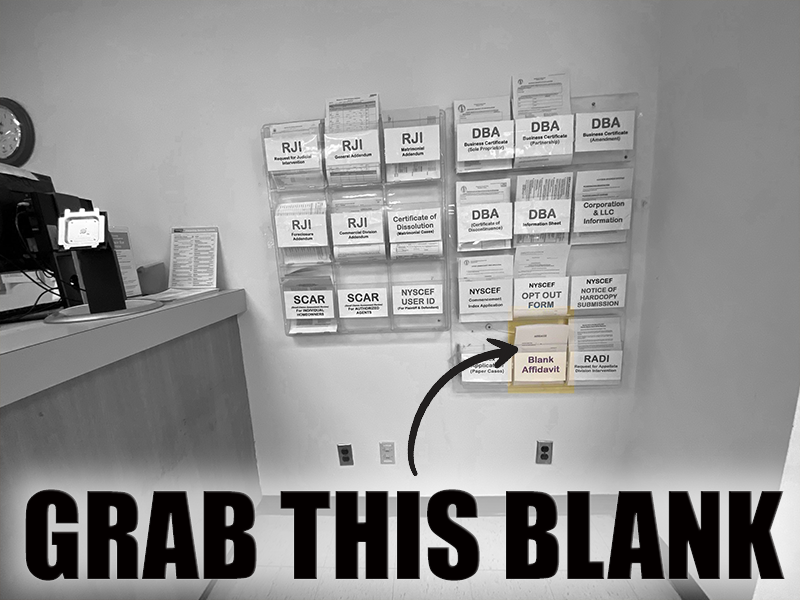
You’ll enter the passport number on the affidavit and sign the paper in front of the clerk, essentially guaranteeing to the recipient that this is an exact copy of your passport. One of the clerks will notarize your affidavit for free.
Once that’s done, they’ll hand you the New York State Department of State Apostille Request form. You’ll fill that out and enclose a check or money order for $10 and a self-addressed stamped envelope.
That’s it! Once you mail it to Albany, you can likely expect it back in about 3 weeks.
Need it faster or don’t want to deal with any of this? Upload a color copy of your passport, and we’ll take care of everything for $149 from start to finish. Want it done in just a day or two? We can do that too!
Call, text, or WhatsApp 7 days a week to (914)441-2444 or begin your apostille application here: apostilleapply.com.
A March 2024 Look at the “New” NY ABA 2021 Power of Attorney
Don’t wait until the last minute to finish this document. In an emergency, this document is powerful even if you have a solid will and/or family trust.
The power of attorney (“POA”) should be part of every adult’s financial and estate planning. Unless an individual’s assets are jointly owned or held by a trust, no one can handle his/her financial affairs in the event of incapacity without a power of attorney. It would take a lengthy and expensive court process to appoint a guardian.
A POA is not just a tool to be used later in life. Every parent of a college-bound student should consider having that young adult execute a POA so they can handle financial matters, or even gain access to their child’s residential quarters, if needed.
Earlier this year, the New York State Legislature made significant changes to the New York power of attorney law, which went into effect on June 13, 2021. Because of these changes, it is important for New Yorkers and others with New York POAs to review them at this time and to consider updating them.
An overview of the changes
Title 15 of Article 5 of New York’s General Obligations Law establishes a “statutory short form power of attorney” by which an individual, the Principal, can designate an Agent to act on the Principal’s behalf in matters of personal and financial nature. Even though the POA form may consist of several pages, especially when permitted modifications are added, it is still called Statutory Short Form, so that the language conferring authority with respect to each power listed on the “short form” is construed to incorporate a full description and extent of the agent’s authorized transactions set forth in the statute. Similar statutes exist in many other states.
Powers of attorney are frequently refused by financial institutions and other third parties. Changes in the New York power of attorney law that went into effect in June simplify the form and reduce the likelihood of financial institutions refusing to honor validly executed POAs.
In 2009, a POA form that deviated from the statutory language would be deemed invalid. The statutory form also limited the agent’s ability to make gifts by allowing only a maximum aggregate annual gift of $500, unless the principal executed a separate Statutory Gift Rider (“SGR”). Additionally, the old law provided no sanctions or punitive remedies for third parties refusing to honor a valid POA.
As a result of the new law, the following significant changes have been made:
- Compliance with statutory requirements. According to the new law, a POA form must “substantially conform” to the language provided in the General Obligations Law *5-1513, but is not required to be identical to the POA form in the General Obligations Law §5-1513. POA forms may be valid even if they contain slight errors in spelling, punctuation, formatting, or type slightly different from the statutory POA form language. The following two warnings, which are in the NY GOL *5-1513, cannot be omitted from the POA: the “Important Information for the Agent” clause and the “Caution to the Principal” clause.
- Legislative gift riders will be eliminated. In order for the agent to make gifts in excess of $500 per year, the principal previously had to execute a separate SGR, which required two witnesses to witness the principal’s signature and an acknowledgment from a notary. By amending the law, a principal can authorize the agent to make gifts up to $5,000 per year, and additionally, the principal can modify the standard POA form to authorize the agent to make gifts exceeding $5,000 per year, and to authorize the agent to make gifts to himself or herself or to make other gift transactions and changes to interests in the principal’s property without the need for a separate SGR.
- Penalties for not accepting a valid POA. In the past, financial institutions have refused to accept a valid, properly executed POA or only recognized their own form. Previously, there weren’t any penalties for unreasonable refusal to honor POA. Under the new law, if a third party is found to have acted unreasonably in refusing a POA, the court can award damages, including reasonable attorneys’ fees and costs. A POA can be rejected under certain circumstances, and there’s a timeline for when it can be rejected. POA recipients have 10 days to accept or reject the POA, or to ask for an affidavit from the agent or an opinion of counsel from the principal, and must then accept or reject the POA in writing within seven days of receiving the affidavit or opinion of counsel.
- Third parties acting in good faith are protected by the Safe Harbor. By law, recipients of a POA are protected if they act in good faith when accepting the POA, even if the POA is later deemed invalid. The recipient is shielded from liability if the following conditions are met: (a) the POA must have the principal’s acknowledged signature verified by a notary public or another authorized to accept acknowledgments; and (b) the recipient must not know that the principal’s signature is forged, the POA is invalid, or that the agent is abusing his/her/its authority.
- Requirement for execution. In New York, a statutory power of attorney, or a non-statutory power of attorney, executed by a principal must: (a) be typed or printed in clear type no smaller than 12 points; and (b) be signed, initialed, and dated by the principal or by another person other than the principal’s agent or successor agent, in the principal’s presence and under the principal’s direction. In either case, the signature of the person signing must be duly notarized and acknowledged, and must be witnessed by two persons who are not named in the instrument as agents or as permissible recipients of gifts, principal. The person who takes the acknowledgment may also serve as one of the witnesses.
Though third parties may more readily accept the new POA form, powers of attorney and statutory gift riders properly executed previously under the law in effect at the time of execution will remain valid.
If you are in Northern Westchester, we can still have your Apostille processed same day if we have everything by 11am. No other Apostille expediters courier to the Westchester County Clerk and the New York State Department of State 5 days a week.
No Record of Marriage Certification
If you thought the “single status” affidavit was enough to get married in another country, think again.
Some countries are adamant about American citizens marrying their citizens. Case in point: Colombia! We’ve assisted hundreds of clients from New York City, Westchester, Rockland and Putnam who believed that all they needed was an apostilled Birth Record and an affidavit stating that they are not currently married. 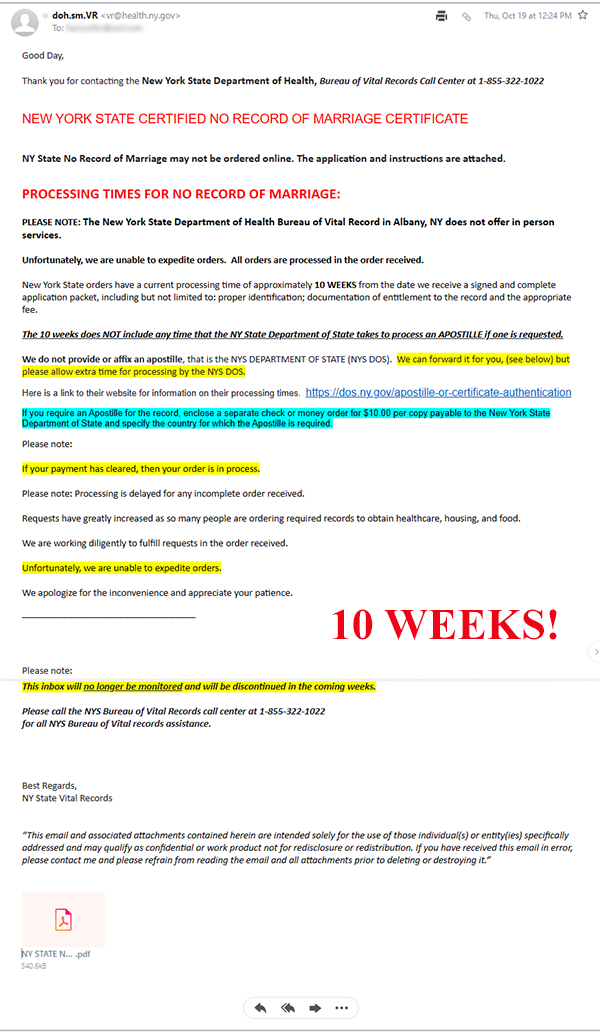
If you’ve mistakenly informed Colombian authorities that you were previously married, there’s a high likelihood they’ll request a No Record of Marriage Certification from the New York State Department of Health. If they are willing to accept an alternative, they might allow you to submit the NYC version if you can prove that you lived in one of the five boroughs at some point. This option is usually the easiest and quickest. 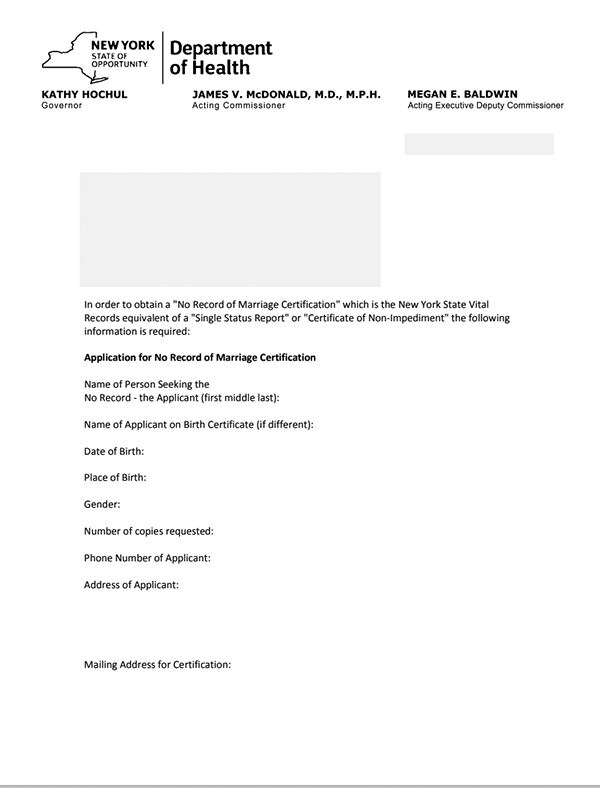
The New York State Albany version currently has a processing time of 10 weeks.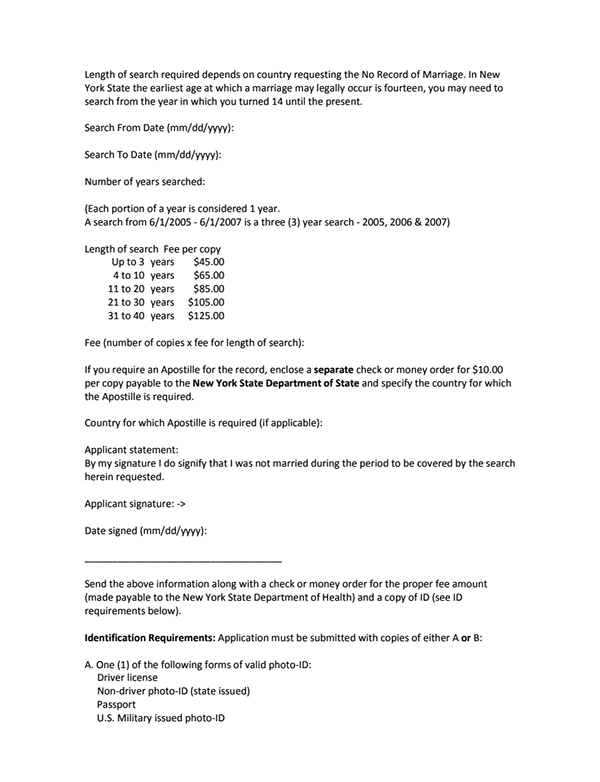
If you have questions regarding how to proceed with your marriage plans in Colombia, please consult with us before informing Colombian authorities about your intention to marry there.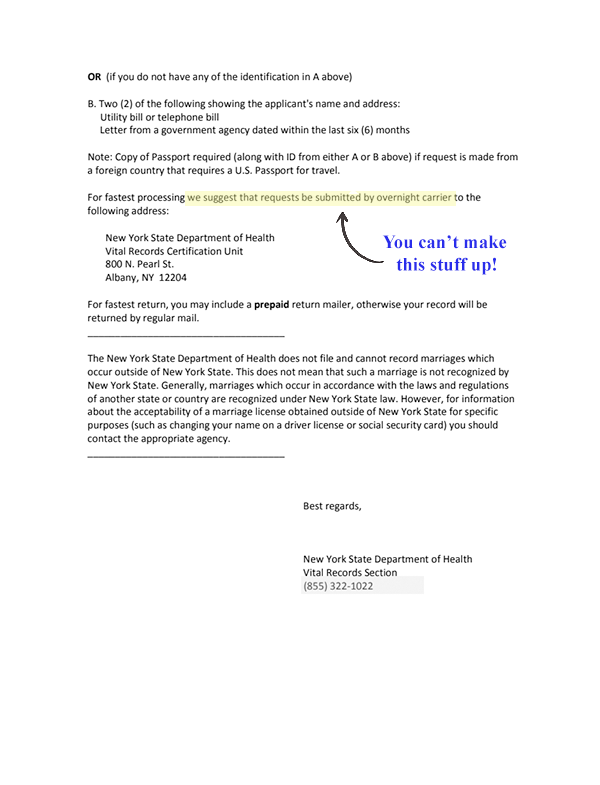
Questions? Call us before you make the move. Call, Text or WhatsApp Apostille Expediter Harry Otto at (914)441-2444 seven days a week. We live this business.
